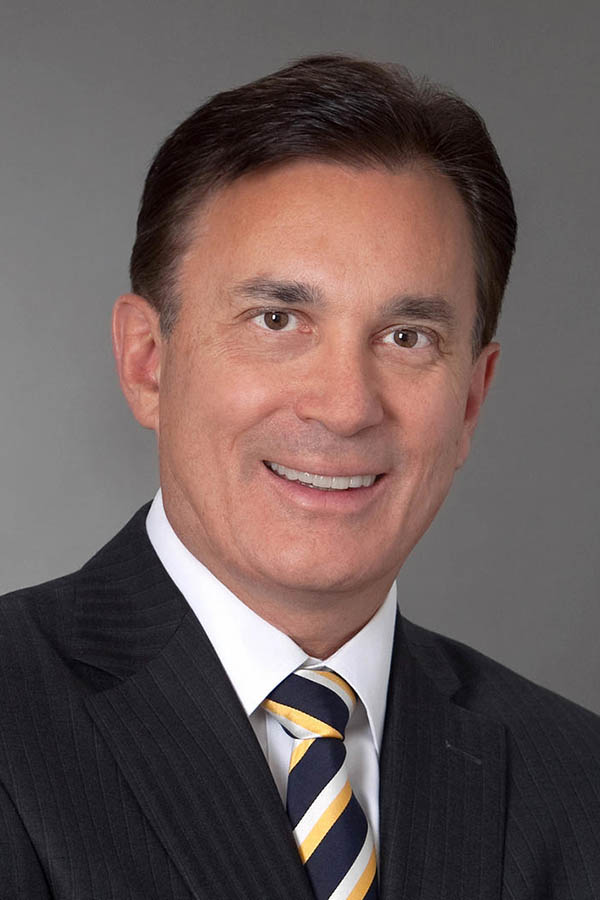The Future of Healthcare

The COVID-19 pandemic laid bare the strengths and weaknesses of the United States’ healthcare system. As the dust settles, professionals at every level of the industry are left asking the same question: What comes next?
To find out, we spoke with Thomas Beeman '75, '77 (MA), PhD, FACHE, FCPP, RADM, USN (ret), executive in residence for the Haub School of Business. Beeman has more than 45 years of experience in the healthcare industry, most recently serving as the chief executive officer of Lancaster General Health and president and chief executive officer at Saint Thomas Health Services in Nashville, Tennessee.
He helped expand the Lancaster General Health System, and during his time as an adjunct professor at Saint Joseph’s, he implemented a program that helped physicians earn their MBAs. In addition to Beeman’s impressive professional career, he served as a rear admiral in the United States Navy Reserve, ending his career as assistant deputy surgeon general.
 Thomas Beeman ’75, ’77 (MA)
Thomas Beeman ’75, ’77 (MA)
Q: What did the COVID-19 pandemic teach us about our healthcare system? And how has the system shifted in light of some of those lessons?
COVID showed that the infrastructure around our public health programs in the United States is relatively weak. We struggle with equality of access to healthcare because public health has been underfunded, as opposed to acute healthcare, which has been funded pretty richly.
The pandemic also showed the strength of our pharmaceutical industry to get a viable and effective vaccine to market within months.
One shift that has been really positive is the acceleration in the use of nurse practitioners and physician assistants in a new complementary capacity. These professionals played a critical role in providing care due to an under supply of physicians.
But the two biggest shifts that the pandemic ushered in are the use of information technology and health informatics, and the need for clinicians and other healthcare professionals to be business savvy.
Q: What role will information technology and health informatics play in the administration of services going forward?
Health informatics is the ability to use information technology in combination with business analytics to really understand what's happening with your patients.
On a micro level, that’s knowing you have 250 patients in a hospital who have diabetes but, through their medical records that are being maintained with information technology, you know that 10 aren’t being treated properly. This allows you to focus your resources on those 10 patients.
On a macro level, you can get into predictive analysis. You can analyze the data and information and determine that, on day three of this particular disease, patients are more likely to be experiencing certain symptoms.
You can then deploy medication or technology to assist those patients through that difficult time. The ability to ask the right questions and deploy the right personnel and therapies is just a godsend.
Down the line, artificial intelligence is going to help drive some solutions using this data, but nothing can substitute for a highly qualified, professional provider.
Q: What role does business play in healthcare? Why is it valuable for practitioners to have strong business acumen?
I am a big believer that people with clinical healthcare backgrounds will benefit from getting a background in business. In a way, a hospital is a lot like a university. A university has a mission to educate, but at the end of the day it is still a business.
Physicians, healthcare administrators, everyone involved has to know how to make prudent decisions. They have to know that there's an awful lot of money spent in healthcare that's wasted. From there, it becomes necessary to identify that waste and figure out ways to eliminate it. That money can be redeployed to the community to help the community get healthier by having access to housing or decreasing food scarcity, for example.
Q: What are the biggest challenges facing the healthcare sector?
Out of the $4.2 trillion that we spend on the healthcare industry every year in this country, probably $700 billion is wasted. A lot of that has to do with needless paperwork, administrative burdens, duplicative technologies, those kinds of things.
Additionally, too many people get care at the wrong part of the continuum. They seek care in emergency rooms rather than through a primary care provider. When I was at Lancaster General, we found that 3% of our patients on Medicaid used 50% of our resources. By shifting those folks to a PCP, we were able to save $10 million.
The reason this happens is a challenge in its own right. Almost nobody understands healthcare, how to access it and what their insurance means. Some people might not know they can see a primary care provider and will hold off seeking medical attention until the problem is severe enough to go to an emergency room.
Access is also a problem. A lot of people who live in marginalized or underserved communities cannot access primary care because there aren’t any PCPs in those communities.
The last challenge I’ll mention is that of staff burnout and the undersupply of physicians.
Q: What is the team-based care model and how can that help address that burnout?
Most hospitals don’t really have a holistic approach to staffing. Team-based care is the solution to that. It’s a delivery model where patient care needs are addressed as coordinated efforts among multiple healthcare providers and across settings of care.
We're finding that team-based care is much more effective. It's higher quality care. When people share the responsibility and they can look out for each other, it creates better outcomes not only for the staff but for the patients as well.
Q: With a high demand for physicians and other healthcare professionals, it seems like there is a lot of opportunity in the field. What is the healthcare sector job outlook and how can universities support its growth?
On the healthcare administration side, there’s going to be a 32% increase in the need for managers up through senior executives, so the opportunities are increasing, particularly for clinicians who have business backgrounds.
"I think Saint Joseph’s is poised very well to be able to meet the students where they are and give them the kind of education they need to be successful in this sector." - Thomas Beeman ’75, ’77 (MA), executive in residence for the Haub School of Business
To any health sciences student, I would say that you would really benefit from having a business competency. Whether or not it's a full degree or it's just business courses, anything helps — specifically if you want to take leadership roles.
With the previous merger with the University of the Sciences and the upcoming merger with the Pennsylvania College of Health Sciences, I think Saint Joseph’s is poised very well to be able to meet the students where they are and give them the kind of education they need to be successful in this sector.
